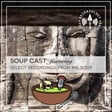
Other Histories are Available! (Contested History & Workload) - WB 10th Sept 2021
Welcome to Watching Brief. As the name implies, each week Marc (Mr Soup) & Andy Brockman of the Pipeline (Where history is tomorrow's news) cast an eye over news stories, topical media and entertainment and discuss and debate what they find.
Support us on Patreon: https://www.patreon.com/archaeosoup
***
0:00 Introduction
01:12 Chester Uni Reprieve
03:49 A Difficult Balance!
25:25 UCU Workload Report
***
Link of the Week
https://www.heritageopendays.org.uk/
https://www.yac-uk.org/news/join-us-at-wales-online-yac
***
Links:
Hong Kong Police Raid Tiananmen Massacre Museum:
https://www.theguardian.com/world/2021/sep/09/hong-kong-police-raid-tiananmen-massacre-museum
Statue of Confederate commander Robert E. Lee Removed in Virginia Capital:
Science Museum to Remove Climate Placard from Shell-Sponsored Show:
Call to preserve Afghan Cultural Heritage and Protect Workers:
https://www.dw.com/en/call-to-preserve-afghan-cultural-heritage-and-protect-workers/a-58957313
Norway Police Seize nearly 100 artifacts reportedly missing from Iraq:
Newcastle University Staff Claim Workloads Unmanageable:
https://www.bbc.co.uk/news/uk-england-tyne-58474726
Workload Report Newcastle University UCU:
https://ncl.web.ucu.org.uk/files/2021/09/Newcastle-UCU-Workload-report-Aug2021.pdf
